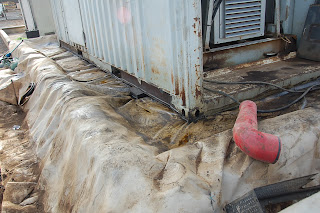The Republic of Djibouti.
The country as a whole is stable politically (due to government subsidy of a narcotic-Khat), although economically it is near the top of the lowest standards of living. They have no major resources, and other than 2 large military bases and a deep water port there is no major industry. The government on paper is a democracy, but is run more along the lines of the famous Italian families that operated 'business' out of New York and Chicago; I am trying to be nice here.
The electric is provided by old diesel generators which are undersized and breaking down, in fact one of the 5 remaining units was taken off line recently. Electric costs are near the most expensive in the world; $.88/KwH.
The climate in the summer is horrid, where temperatures can get up to the 120 degree with heat index above 140.
A place where sustainable construction should be the norm is non-existent. Buildings are constructed out of concrete blocks (cinder), with no insulation. Windows are cheap and installed with gaps in the frames, no solar reflective quality. No weather striping around doors, nothing. The most non-energy efficient structures you could possibly imagine being built in the most high cost energy country with a super low per capital income.
I have learned, when I asked why insulation is not being used and the reliance on concrete bricks, that this construction method/materials and lack of insulation is a designed plan by the government. The idea is for the populace to use more energy, to maximize income from electric sales! I am sure few would believe it, but up until this year solar power was not allowed to be installed (jail time) in the country.
The lesson is to know about the country you are planning on building in and do not assume that if it is of benefit (alternative energy), that it is legal.
Believe it Or Not
The country as a whole is stable politically (due to government subsidy of a narcotic-Khat), although economically it is near the top of the lowest standards of living. They have no major resources, and other than 2 large military bases and a deep water port there is no major industry. The government on paper is a democracy, but is run more along the lines of the famous Italian families that operated 'business' out of New York and Chicago; I am trying to be nice here.
The electric is provided by old diesel generators which are undersized and breaking down, in fact one of the 5 remaining units was taken off line recently. Electric costs are near the most expensive in the world; $.88/KwH.
The climate in the summer is horrid, where temperatures can get up to the 120 degree with heat index above 140.
A place where sustainable construction should be the norm is non-existent. Buildings are constructed out of concrete blocks (cinder), with no insulation. Windows are cheap and installed with gaps in the frames, no solar reflective quality. No weather striping around doors, nothing. The most non-energy efficient structures you could possibly imagine being built in the most high cost energy country with a super low per capital income.
I have learned, when I asked why insulation is not being used and the reliance on concrete bricks, that this construction method/materials and lack of insulation is a designed plan by the government. The idea is for the populace to use more energy, to maximize income from electric sales! I am sure few would believe it, but up until this year solar power was not allowed to be installed (jail time) in the country.
The lesson is to know about the country you are planning on building in and do not assume that if it is of benefit (alternative energy), that it is legal.
Believe it Or Not







